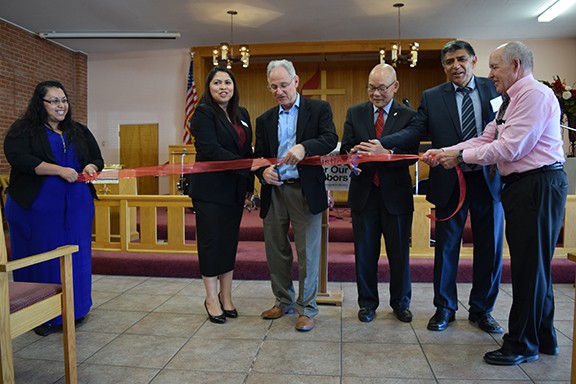Pastor Augustin Jimenez calls his southside Methodist church a "small church with a big heart." This church's heart includes a drum kit and electric guitar below the dais, water harvesting to feed the native trees in the yard and, now, an immigration legal services clinic.
The church fills with people on a Thursday afternoon. Children play quietly. Several women wearing clergy collars sit in the pews. Mayor Jonathan Rothschild chats with prominent Methodist Bishop Robert Hoshibata. In the back, a table is piled high with goodies: cupcakes, cookies, juice.
Hoshibata, who drove down from Phoenix for the event, addresses the crowd.
"God has called us to a place where we can't just sit and accept what is happening around us," he says. "God calls us to use the gifts that we have to do something positive, transformational that will make a difference in this world."
Arizona Justice For Our Neighbors, or JFON, just opened the immigration legal services clinic at the New Hope United Methodist Church. The clinic's focus is helping undocumented immigrants with a familial route to residency understand their rights and what options are available to them.
JFON is a nationwide network of 18 immigration legal clinics. And the Tucson branch has been over a year in the works. They hosted their first clinic in January, ahead of the Feb. 1 grand opening. The next clinic will be on Feb. 10 and every second Saturday thereafter, from 9 a.m. to noon.
People should make an appointment so JFON volunteers can prepare ahead of time. After the initial meeting, participants can make follow up appointments Mondays through Fridays, 9 a.m. to 4 p.m.
The Arizona JFON raised $90,000 to launch the clinic. Funding came from many individual donations, a $20,000 grant from the Inn Project and a $40,000 matching grant from the National JFON. The clinic charges $50, for low-income individuals, to complete immigration cases.
The Tucson clinic is led by attorney Ella Rawls, the daughter of a United Methodist pastor who says opening the clinic is the realization of a dream.
"Our immigrant brothers and sisters need us," she says. "They need our help. They need to be recognized as people that are equal to native-born Americans."
In Pima, there are 33,000 immigrants eligible for citizenship, says Rothschild. Tucson is an immigrant-welcoming city, and Rothschild tells the crowd the city protects the civil liberties and human rights of all Tucson residents and visitors.
"And not because it's politically correct, but because standing up for civil liberties and human rights is standing up for American values," he says. "What Ella's doing by doing this work is standing up for the Constitution, defending the Constitution and the vision of our founding fathers. And the term for that is not political correctness. The term for that is patriotism."
The church is a comfortable and safe community setting where people can have an open dialog about their legal options. Rawls encourages community members to become involved by volunteering and spreading the word about the clinic.
"Part of our mission is not only to provide those immigration legal services, but to challenge some of the ways that immigration has been talked about and to challenge some of the ways that our immigrant brothers and sisters have been characterized," she said. "In God's eyes, we are all the same."
Carol West, a former member of the Tucson City Council who's a supporter of JFON, said the clinic is important to inform immigrants of their rights.
"A lot of times, these immigrants hide in the shadows, and they're afraid to reach out," she said. "Some of these people who would be deported, and some of their children would be left behind, Ella can advise them on what can and can't be done."
West is a Methodist, and she says she almost fell out of her chair when she found out that U.S. Attorney General Jeff Sessions is as well. Helping people in need is an integral part of being a Methodist, West said, and she doesn't see how Sessions is following the Methodist teachings when he supports policies that hurt immigrants and separate families.
Hoshibata said immigration is dear to his heart. The Bishop is a third-generation American, with his grandparents migrating to the U.S. from Hiroshima. He believes that the farther away a person is, in time, from their family's migration to the U.S., the less they understand the "courage that it takes to be an immigrant."
"What we are doing is reminding the community that the courage of the immigrants who are among us, part of us, is an important part of who we are and how we progress as human beings," he said. "There are those in our communities, and certainly in this nation, who would seek to divide us by words that talk about hatred, fear and the differences that we have.... These are persons who have forgotten that it is God's intention that we are all a part of one human family."










